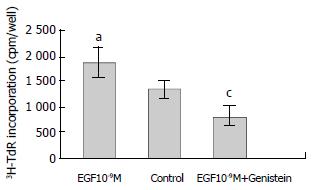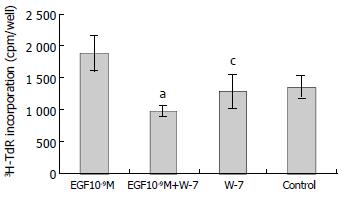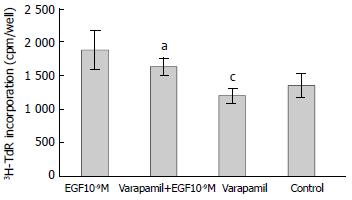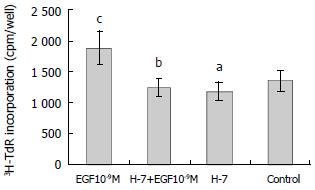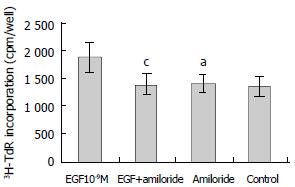Copyright
©The Author(s) 2003.
World J Gastroenterol. Feb 15, 2003; 9(2): 271-275
Published online Feb 15, 2003. doi: 10.3748/wjg.v9.i2.271
Published online Feb 15, 2003. doi: 10.3748/wjg.v9.i2.271
Figure 1 Effect of genistein on EGF-induced 3H-TdR incorporation into hepatoma cells.
n = 6, -x ± s, aP < 0.05, versus control; cP < 0.001, versus EGF 10-9M.
Figure 2 Effect of W-7 on EGF-induced 3H-TdR incorporation into hepatoma cells.
n = 6, -x ± s, aP < 0.001 vs W-7 group; cP > 0.05 versus control.
Figure 3 Effect of verapamil on EGF-induced 3H-TdR incorporation into hepatoma cells.
n = 6, -x ± s, aP > 0.05 vs EGF 10-9M group; cP > 0.05 versus control.
Figure 4 Effect of H-7 on EGF-induced 3H-TdR incorporation into hepatoma cells.
n = 6, -x ± s, aP > 0.05 compared with control; bP < 0.01 vs EGF 10-9M group; cP < 0.05 versus control.
Figure 5 Effect of amiloride on EGF-induced 3H-TdR incorporation into hepatoma cells.
n = 6, -x ± s, aP > 0.05 versus control; cP < 0.05 vs EGF (10-9M) group.
- Citation: Wu BW, Wu Y, Wang JL, Lin JS, Yuan SY, Li A, Cui WR. Study on the mechanism of epidermal growth factor-induced proliferation of hepatoma cells. World J Gastroenterol 2003; 9(2): 271-275
- URL: https://www.wjgnet.com/1007-9327/full/v9/i2/271.htm
- DOI: https://dx.doi.org/10.3748/wjg.v9.i2.271













